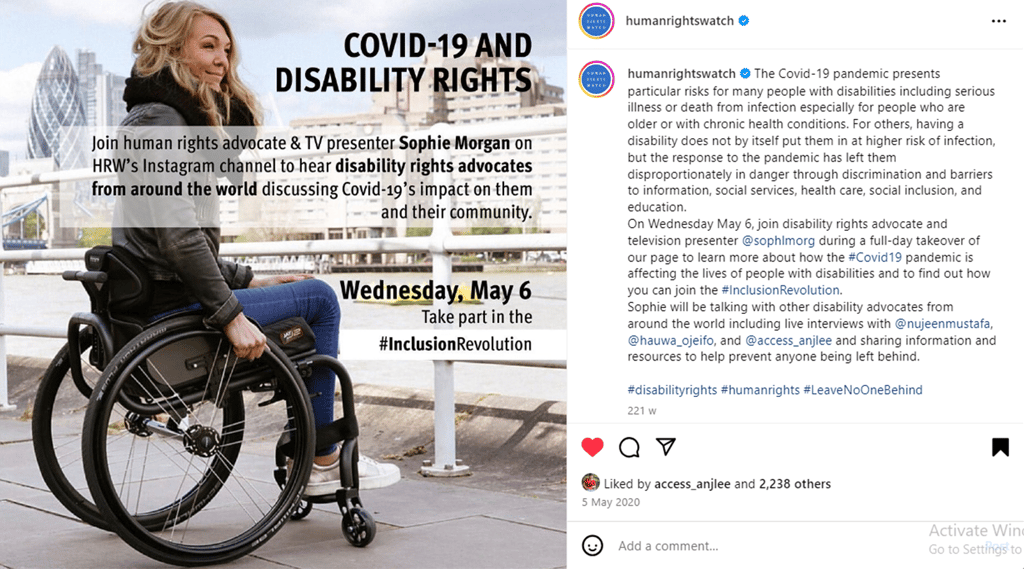COVID-19 Pandemic Lockdown:
Disability Inclusion and Preparedness to Prevent Disaster
Inclusion of people with disabilities (PwDs) through the various aspects of the pandemic from the initial phase of the lockdown in 2020 to the vaccination drive to the present humanitarian crisis has been flawed, with challenges and gaps, at every step along the way. Even though, PwDs are at a higher risk of COVID -19 and even death, yet they are not being given the needed priority in India’s COVID-19 response. This can be observed from the fact that every guideline issued for PwDs has only emerged as a response to active advocacy efforts. Moreover, there are pending cases in various courts petitioning for prioritization in vaccination for PwDs also an advocacy initiative by the people for the people.
The COVID-19 pandemic has exacerbated the vulnerability of people with disability to isolation and discrimination, affecting their right to live independently and be included in the community. The pandemic threatens to reverse gains achieved from years of advocacy that had started to ensure policies and programs were disability-inclusive in line with the United Nations Convention on the Rights of Persons with Disabilities (UNCRPD). In such situations of the humanitarian crisis, PwDs remain the most left out and deprived category in availing of support and care.


No Looking Back
Using new communication technologies such as WhatsApp, Samarthyam Team set up an active group of 327 OPDs under UNESCAP partnership project “Protecting and empowering persons with disabilities in the context of the COVID-19 pandemic”. The project activities were planned in full swing; however, India was hit by the second wave of the COVID-19 pandemic, bringing back lockdown all over the country. Hence, the aim of the group formation is to share information on the activities and plans under the said project and decide the way forward during the lockdown.
As the COVID-19 devastation unfolded, the chaos spread, and the confusion rose, this WhatsApp group became a useful platform for the OPD members. They shared information on governmental guidelines, vaccinations, and other information regarding protection, prevention, treatment, and access to essential services. The group started vibrant discussions on day-to-day challenges and concerns, which were common and could be remedied with governmental and non-governmental support. The issues identified in the WhatsApp group ranged from the need to give precise information on COVID-19 vaccination, protection mechanisms, the need for training of personnel, the need for home-based vaccination for those severely disabled, and information on restrictions, services, etc. in accessible formats.
Leave No One Behind
With the practical reality of disability inclusion falling through the cracks in the governmental as well as the general response to the crisis, the PwDs had to make many efforts to get disability concerns on board. A direct outcome of the discussions was the need to have a National Guidelines/ Advisory for PwDs clarifying the Do’s and Dont’s for themselves, caregivers, and the government. The draft Advisory was sent for review to State Disability Commissioners of India, higher officers in the State Social Welfare Departments, and other OPDs. Samarthyam sent the final version to the Department of Empowerment of Persons with Disabilities, Ministry of Social Justice & Empowerment, Government of India for notification. Never before, had the Samarthyam team been able to compile and document such a large volume of technical advice in such a short period of time.
Studies have shown that PwDs are three times more likely to get infected or die of Covid-19 than the general population. They experience a higher risk of contracting the virus as they require staying in close contact with others for personal care needs. And if infected, recovering is a challenge.
When the going gets tough, the tough get going
Given this fact, it is most essential that PwDs are prioritized through the vaccination programme and for this Samarthyam strongly felt the following needs to be ensured:
Availability of correct and precise information regarding vaccinations at all points of information generation and dissemination amongst the populace;
Information is easily available and complies with information and communication accessibility standards;
Physical accessibility is met at all vaccination centers with appropriate facilities for wheelchairs, accessible toilets and requisite assistance for PwDs including volunteer support;
Home-based vaccination drives for PwDs and senior citizens who cannot go to the centers; and
Drive-in vaccination points were established in Mumbai city in India.
Way forward
Given this fact, it is most essential that PwDs are prioritized through the vaccination programme and for this Samarthyam strongly felt the following needs to be ensured:Deliberating with people with disabilities from other parts of the country, an Advisory was drafted by Samarthyam. The Advisory was to be notified by the central government for all state governments’ compliance The Advisory contemplates upon factors viz. Do’s and Don’ts for PwDs, Caregivers and State Parties, and access to essential services by PwDs and their families. Hence, the Advisory was sent to the Department of Empowerment of Persons with Disabilities, Ministry of Social Justice & Empowerment, Government of India for notification and implementation by the state governments. Similar support and strategies are required by the National Disaster Management Authority.
Lessons learnt
The active participation of almost all the OPD members on the WhatsApp group showed how shared concerns and discussions can help come up with solutions. We learned that having such easily accessible communication platforms for PwDs have several benefits including:
Disaster can strike anytime and pandemic have set an example of ‘coming together’ works well only if ‘social distancing’ is maintained.
Both top down and bottom-up approach, advocacy and networking are required to mandate disability inclusive disaster preparedness, risk reduction and management processes.
Help people with similar interests or the same departments to stay in touch and to identify the issues at the grass root level to support the most vulnerable PwDs.
Spreading, sharing, and understanding of information in accessible formats for maximum outreach.
Sharing of knowledge, and experiences and providing recommendations happens at a faster pace and evokes active participation.
Vaccination priority and equity with support of central and state governments in accessible places. For super senior citizens and people with high support needs it should be in their place of choice/ home.
Women with disabilities worked within their communities to prepare masks, spread mass awareness, address inequalities and create an inclusive environment for everyone to build ‘forward’ better.
Above all, the WhatsApp group became a real-time platform connection between OPD members and Samarthyam experts/ trainers on disability issues, when most needed.


